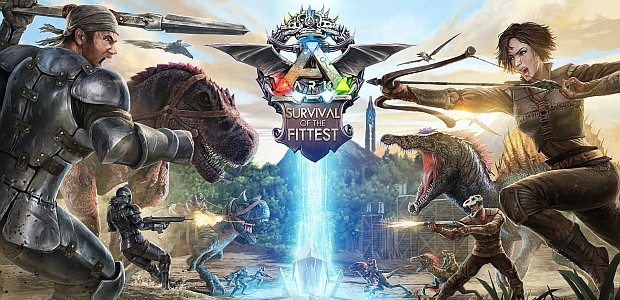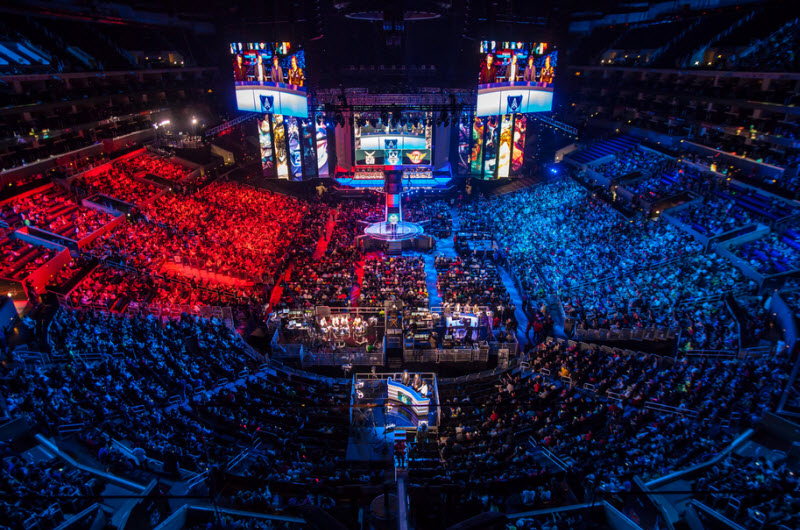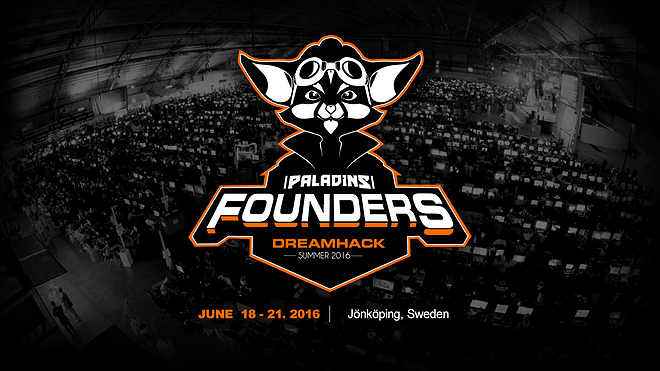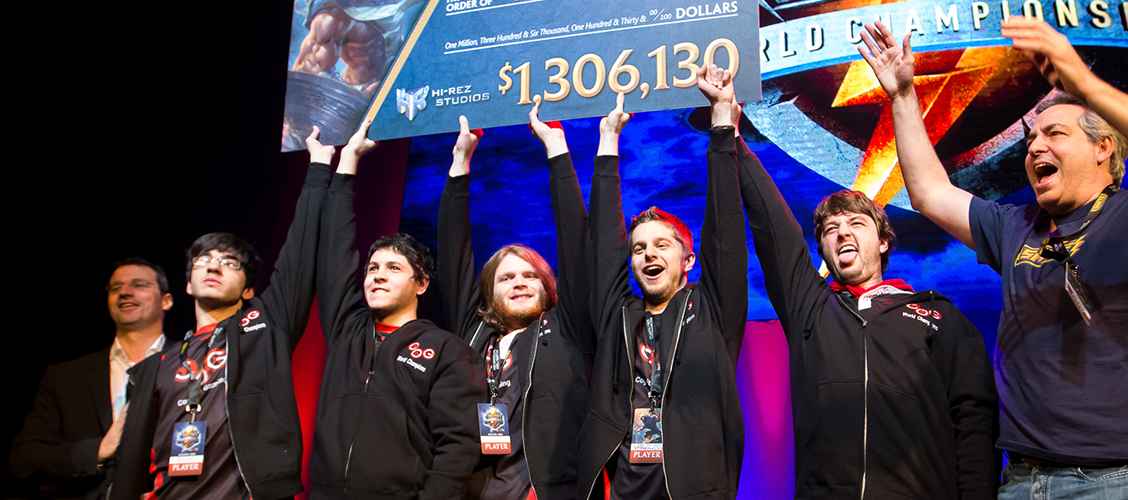Over the past few years, the video game industry and the rapidly growing eSports scene have had more than a few issues to contend with — piracy, character breadth, problems with crowdfunded projects, a years-long social and Internet war about the medium itself, and, of course, the early access/pre-order debate.
Piling on to this big Katamari-esque ball of problems is the recent trend for “eSports” games (games designed specifically to have a competitive eSports user group rather than a broader, more casual gamer market) to have a tournament series lined up and in progress before the game itself has actually been released.
As a prime example, let’s take ARK: Survival Evolved — and its 2015 tournament series with a $60,000 prize pool. While it was in an accelerated, “designed for competitive play” mode called Survival of the Fittest, a free-to-play subgame released from the ARK developers, it’s still ARK — a game slated to be released later this year.

The problem is immediately apparent, and poses a few valid questions as eSports continues to define and redefine itself:
Is this even a good title? Are we being tricked by a tournament scene into playing a potentially bad game? Does it matter?
While early or exclusive access can be problematic, and is a discussion still going on in the gaming community, I believe the answers to the above are actually: I don’t know, possibly, and absolutely not.
I realize that’s a little confusing, so let’s break it down.
Is this even good?
You had me at dinosaurs, lasers, and dragons.
ARK itself has gotten both some positive reviews and incredibly hostile criticisms (mostly revolving around it’s snowbally, “here first” power structure, poor optimization, or the absolutely endless hours required). The truth is that defining whether or not it’s a good game will be both done after the actual release late 2016, and be more of a slew of conflicting opinions rather than any singular consensus.
The truth is also that this is a process that will repeat itself with every new title. While you can usually ballpark titles based on developer history, sometimes games that should have been incredible fall flat, and things that should’ve never gotten out of the idea phase are overnight successes. Even FROMSoftware wasn’t exactly a rockstar until around Dark Souls. It’s very rare for a game to be voted universally or near universally-bad (some Sonic titles excluded), so whether a game is actually going to be good is almost always “it depends, let’s wait and see”. I mean, even Mighty No. 9 has its supporters, right?
So…are we just being tricked?
Pictured: trustworthy game developer Patches
When it comes to the second bit, “are we being tricked by a tournament scene into buying into a potentially bad game?”, I answer possibly — only because this answer will vary wildly depending on your definition of “tricked”. New games and untested tournament waters are always that, and professional eSporters (e-thletes?), or those getting into the scene, are usually aware of the strange meta-game involved:
“We can jump on this new game, get high up and involved early and keep ahead – but if it tanks, if it isn’t good and doesn’t stay alive, that’s time we could have spent fighting our way up in anything else”.
It’s a hard risk/reward call, but risk/reward calls are also very literally what an e-thlete does. On the upside, if you manage to prize the prerelease tournament, you’re at least up however much money was involved even if the game goes under. If you don’t, that’s unfortunate — but at least you’re less invested in the game if it goes south, which leads us to the third point…
Does it matter if we are?
I answered this with absolutely not, and here’s why — it’s money into the eSports scene. All of the above are risks found in every video game purchase ever. Especially a pre-order. But that doesn’t stop anyone from making them anyway.
A game can always be bad, even if it doesn’t look like it. Even if it shouldn’t be. A game can always fail. If we’re being honest, eventually every game will always fail. Even World of Warcraft will turn off its last server eventually — one day, a Molten Core raid will be the last time anyone ever runs giggling into their group when they’re the bomb, and that’s that. It’s time to move on, so turn off the Lightwell on your way out.
It’s inevitable. No game is forever, and they never have been. No series continues without drastic changes that will alienate many players and attract others (looking at you, Final Fantasy). Nothing is forever, and gaming is no different.
The difference here is that many of these pre-release tournament titles are taking a colossal leap of faith and trusting their players, both regular and professional, with helping them make their game better for us. Better not just for gamers, but professional gamers – lovers and players of eSports.
Take, for example, the Paladins pre-release tournament, which just happened over the summer at DreamHack (and shelled out 100,000 in prizes to the top two teams). It exemplified many of the fears found in pre-release/early access games for tournament play, but also is a fantastic showcase as to why these fears are unfounded.
The truth is, when it first opened up its doors for Founders, Paladins was…not great. A little clunky. A little repetitive. A little unbalanced. A little odd. With Blizzard’s Overwatch hit, comparisons were inevitable, and Paladins had a hard time defending that particular objective. At the time, a lot of the critique was right. At the time, it probably was the lesser of two titles. Now, though, I’m not so sure.

While Overwatch might certainly have the sheer numbers to sustain its top 5 Twitch slot, Paladins is no longer a clearly inferior game — it’s very close, and a large portion of that is due to things like the Founder’s Tournament at Dreamhack, where developer Hi-Rez (who isn’t exactly a stranger to going toe-to-toe with entrenched franchises in the eSports ring) started a competitive scene for a competitive game, involving known competitive players.
Rather than just trying to “trick” players into playing something subpar with the dream of being the next Faker for the next League of Legends, this pre-release scene integration helped the development of the game immensely, and everyone involved profits when that happens. Professionals profit from a game more likely to stick (and any prize they win), the developers profit from their end product being better for the scrutiny, and eventually non-professional players profit from a better overall end product.
Paladins, and the Founders tournament (and hopefully ARK after their Survival of the Fittest tour, or any other developer registering a tournament scene) managed to put money in the pockets of eSports players while opening up the gates and saying:
“Here. Play. Break this game in half. Tell us everything you hate. Show us every problem, work over every exploit. We’ll fix it. We’ll make it better. We’ll build it higher, make it prettier, run it smoother. We’ll make it good for tournament play.”
If that sounds familiar, it’s because it’s open beta testing. The difference here? There’s a prize pool on the line, and a tournament setting. Why? Because of lot of these titles revolve around a central concept to eSports — the competitive tournament game. When your core user concept was a person at home, it’s fine to have it tested by the people at home. When your core user-group is tournament players and viewers, though? Well…your game had better hold up in a tournament.
If that’s a troubling trend…if that’s a trick…it’s a pretty good one. It’s another scene, another avenue for established or potential e-thletes, another prize pool for what is essentially competitive beta testing. Will every tournament game survive? Probably not. In fact, I imagine very few will as more and more developers try their hand at tournament gaming.
But that’s fine. The more people get paid to play video games, the better. The more money and options that go into the eSports scene, the better it is for every aspiring eSports player or fan. The more tournaments are held, the more possible it is for you, or I, or any player out there to break in. The more tournaments are held, the more entrenched eSports become as a concept, and the more viable it is as an option — and options are never a bad thing.
But what do you think? Are early access tournaments an evolution of the competitive gaming industry, or just a trap gamers have to survive? Be sure to sound off in the comments below!











Published: Aug 1, 2016 02:03 am